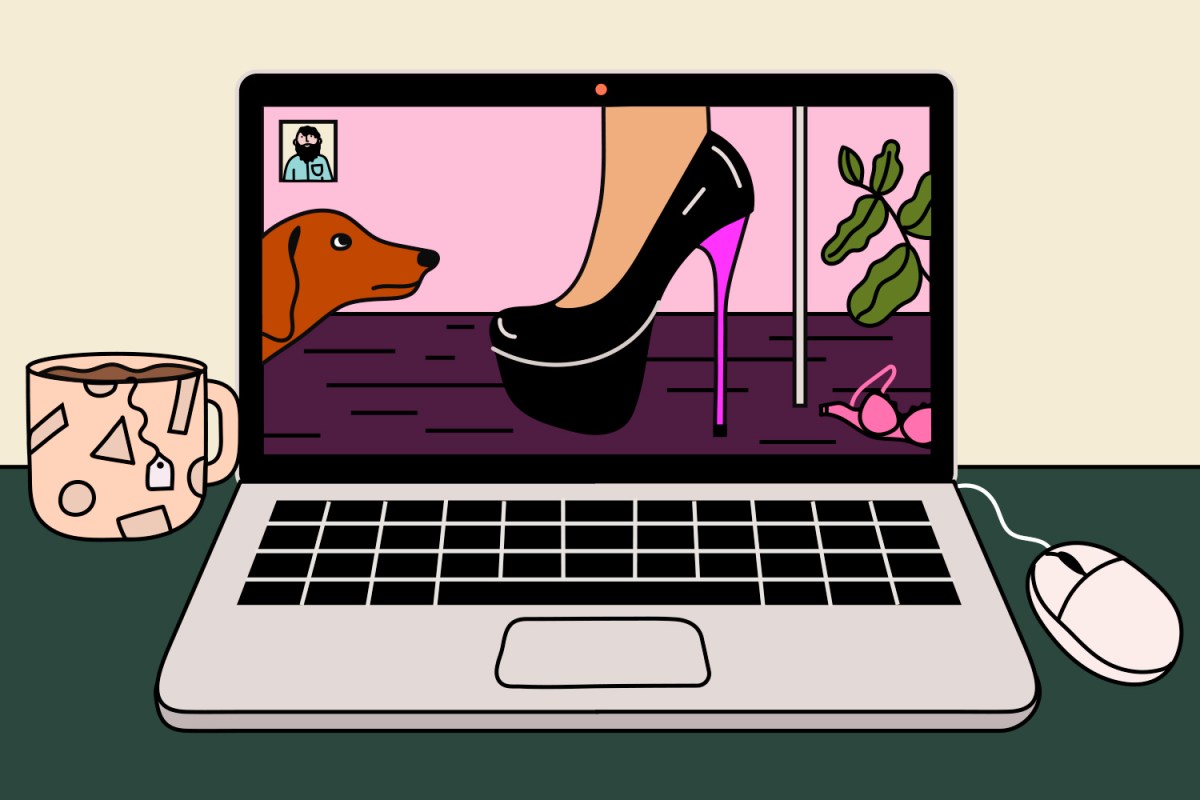We tend to have a lot of faith in the internet, not all of it misplaced. After all, what’s left of society as we know it is almost entirely propped up on the world’s collective, increasingly burdened WiFi connection right now.
But while most of us who are lucky enough to still be working at all have taken that work online in these times of pandemic-imposed quarantine, not all fields lend themselves as easily to digital conversion as you may think — including, surprisingly enough, various branches of the sex industry.
The internet and sex have made unsurprising bedfellows since the former’s earliest days. But while our increasing WiFi dependence and loosening rules governing online horniness may make this pandemic seem like boom times for sex workers and erotic content creators, the barrier for entry is often much higher than the internet tends to reveal.
“It takes ages to gain a following and even longer for that following to part with their cash and pay for your content,” U.K.-based direct sex worker Grace Sumner wrote in a recent Twitter thread. “This takes too long during a pandemic,” she wrote, explaining that in addition to obtaining pricey equipment — ranging from tripods and lighting to sex toys and lingerie — successful online sex work also requires content creators to carve out space for themselves in an increasingly saturated and diverse field of beautiful and talented creators, entertainers and providers.
“Online sex work isn’t the ‘easier’ option, it requires a lot of emotional and physical labour, financial reinvestment and effort to generate income,” she continued. “It’s not about flashing ya nipple and earning big bucks — otherwise we’d all be doing it.”
But while not everyone can make the transition from the street or the stage to the screen, most have no choice but to try. Unable to collect unemployment, sex industry providers and entertainers face even more financial uncertainty than the millions of furloughed employees that have lost their income in other fields. “I think everyone is still in a state of shell-shock,” Midwest-based sex worker and adult content creator Maia Rain tells InsideHook. “While many sex workers are starting online accounts and subscription sites, there’s not much else we can do.”
As sex workers’ rights activist Kate D’Adamo noted in a blog post for escort directory Slixa.com last month, the intimate nature and frequent travel often involved in sex work meant many providers were already losing business well before shelter-in-place mandates made direct sex work nearly impossible. While D’Adamo noted that workers “are resilient and continuing to adjust their work,” their options are more limited than the world wide web of erotic entertainment may suggest.
“The glossy answer, of course, is that folks will simply move into online work of various kinds (virtual dating, cam work, adult content/clips creation) and will be able to sustain themselves,” Slixa CEO Lee Ann Jennings tells InsideHook. “But the barrier for entry to that can be higher than with other types of work, and not everyone is able or ready to learn a whole new skill set in a time of crisis.”
Meanwhile, as providers and entertainers are forced to enter an already crowded online industry, they also face competition from increasing swathes of cash-strapped newcomers lured into online sex work by the easy money misconception.
“Traction is definitely difficult to find, especially as the market is being flooded with newcomers,” Maia Rain tells InsideHook. “However, longevity in the sex work industry is rare. We can expect to see quite a few abandoned accounts as newbies decide it’s more than they bargained for,” she adds. “Consistency and persistence is extremely important in online sex work.”
While Maia tells InsideHook she’s “lucky enough to live with someone who is eligible for government assistance,” she adds that not all sex workers have someone else’s government support to fall back on, and other sources of financial support within the industry tend to be scant and risky.
“Crowdfunding is dangerous and difficult to track when it comes to sex work, because so many of us operate under stage names and keep our information private,” she explains.
That’s part of the reason Jennings at Slixa calls this “an important time to talk about decriminalization and the ways that would offer some legitimacy and support to independent workers who are ineligible for workers’ comp or unemployment insurance in the U.S.”
“If a home health care worker is unable to perform their job because of furlough or distancing orders, they are likely eligible to collect unemployment,” she tells InsideHook. “But a professional companion faced with the same challenge for the same reasons — they’re just out of luck?”
Meanwhile, even professionals who earn a legally recognized living, such as strippers or other nightlife entertainers, may find themselves similarly out of luck. Because such performers are typically classified as independent contractors, most have found themselves unable to collect unemployment as the industry shutters, leaving many with no choice but to try to recreate the magic of live performance online.
“It’s very difficult to make money online,” New York City burlesque dancer, nightlife entertainer and producer Puss N Boots tells InsideHook. “Online content is vastly different from what I do as a performer. You can’t just create what happens at The Slipper Room in your living room, it’s an experience.”
And while it may be impossible to replicate that experience online, many performers and producers are trying their hardest in an attempt to keep the industry alive. Various producers have begun planning online burlesque shows, including Fire and Fury, which hosted its first weekly “stay-at-home” show via Vimeo last week, as well as Puss N Boots’ monthly rock and roll show, Naughty Noir, set to make its digital debut on April 9.
“I’m attempting new ways to entertain through the virtual world, but who knows if the content will make money,” says Puss N Boots. “It’s difficult to make content online for me and for my fellow performers as most of us do not have a background in video work or editing or access to proper lighting, etc. It’s a whole new beast to tackle.”
As sex workers, nightlife performers, and all manner of bold artists and professionals who make a living “professionally naked” (as Puss puts it in her Instagram bio) wade into uncharted territories to keep their industries alive, what they need most of all is direct support.
“Using services to send money like Venmo, PayPal or Zelle to send tips to your favorite performers that you miss seeing LIVE is always a good idea during this time,” Puss tells InsideHook, adding that fans can also help by purchasing content and supporting virtual shows.
“I have personally had a few very kind individuals reach out to me and ask for my Venmo, and they have in turn sent me money during these hard times. It was so kind and had me in tears!” she adds
“Tip, tip, tip,” echoes Maia. “We need direct support right now more than ever.”
As nightlife legend and longtime sex workers’ rights advocate Jo Weldon recently told a class at her New York City School of Burlesque, “People have been taking their clothes off onstage for as long as there have been people and stages and clothes to take off.” The business of professional nudity, then, has surely survived many a global crisis since the first person to take off the first clothes on the first stage. As artists and professionals weather this latest one online, that resilience will have to shine through the screen until we can safely welcome them back to the stage.
Whether you’re looking to get into shape, or just get out of a funk, The Charge has got you covered. Sign up for our new wellness newsletter today.
























